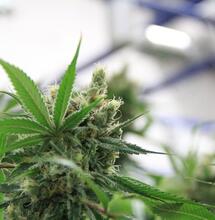The Medical Marijuana Movement:
_18.jpg)
In most countries, using hemp is prohibited even for medical purposes. Self-medication with Cannabis has brought a great number of normally law-abiding citizens into conflict with the legal system.
In most countries, using hemp is prohibited even for medical purposes. Self-medication with Cannabis has brought a great number of normally law-abiding citizens into conflict with the legal system.
In most countries, using hemp is prohibited even for medical purposes. Self-medication with Cannabis has brought a great number of normally law-abiding citizens into conflict with the legal system. Patients often feel compelled to engage in a political struggle for not only their lives or health, but for their freedom as well. People often become criminals merely for obtaining their needed medicine. Willingly or not, they sometimes become known as civil rights activists and freedom fighters. The international fight to get the sick and dying access to medically approved Cannabis has been going on for many decades now.
First legal medical
Robert Randall was the first legal medical marijuana patient in the US since Cannabis prohibition began in 1937. At 25 years of age he was told he would be blind before he turned 30; he kept his eyesight, however, thanks to medi-weed until he died of AIDS 28 years later. Forced to break the law to save his eyesight, Bob sued the federal government to obtain legal access to Cannabis and won, then continued to work on behalf of other patients. Randall convinced the judge that he would have to break the law, for medi-weed kept him from going blind. In 1976 Washington, DC.
Superior Court Judge James A. Washington ruled that the patient had established a defense of medical necessity. Unfortunately, the federal program providing legal Cannabis medicine to patients was soon closed down by the government. Randall was an inspiration to countless other medical freedom fighters around the world. Keith Stroup, executive director of NORML, called him “the father of the medical marijuana movement.” By 2011, medi-weed has become legal in 15 states. The drug is commonly prescribed for glaucoma, nausea, poor appetite and pain.
In their book, Marijuana Rx: The Patients’ Fight for Medicinal Pot,
Robert Randall and Alice O’Leary describe the situation of medical Cannabis users in the US in harsh words: bureaucrats are willing to arrest, jail, blind, cripple and even kill seriously ill people to maintain “the consistent message” of “zero tolerance” and fight “the evil weed”. There is also a cult of synthesis: only drugs invented and owned by large companies are welcome; any natural medicine that is easy to grow at little or no cost but cannot be patented threatens the corporate monopoly. For example, a synthetic anti-nausea drug used by cancer patients undergoing chemotherapy may even cost $600 per dose, usually $1,500 a day. By comparison, Cannabis controls vomiting better and costs $0.50 per day.
The authors conclude that the American people are starting to realize their government is increasingly anti-democratic, and much too often run by liars and crooks. In the 1970s and 1980s two-thirds of the US legislatively mandated that Cannabis had medical value, but the unelected drug warriors in Washington blocked these popular state efforts. The Attorney General threatened to arrest any doctor who dared to even mention medi-weed use with a patient. The government also proposed a ban on any and all research into the prohibited plant’s potential benefits.
The propaganda
Despite all the propaganda, harsh laws, suppression and denials by government, patients have discovered hemp’s healing powers for themselves and used it, trusting their own intuition, folk tradition or gossip. Only recently have various independent experts started to notice that the masses were right in their judgment about this famed, yet illegal, folk remedy. David R. Ford notes in his book Marijuana: Not Guilty as Charged that falsely instilling fear into the hearts of citizens is immoral, while withholding medical Cannabis from patients is criminal. It is hypocritical to ban this relatively harmless drug – which has never caused one death – and leave dangerous drugs like alcohol and nicotine legal.
Ford notes that in the US, physicians can prescribe about 50,000 drugs, many of which can cause death or seriously bad side effects. Yet they cannot prescribe non-toxic Cannabis preparations. Ford suggests that many of the crusaders for the anti-pot war may have honestly concluded that Cannabis is the evil they have been brainwashed into believing it to be, as few people could be so heartless intentionally. As Stanley Milgram (a Yale psychologist and an expert on issues of civil obedience) has written, ordinary people, simply doing their jobs, without any particular hostility on their part, can become agents in a terribly destructive process.
Republicans
Franklin C. ‘Lyn’ Nofziger, former deputy chairman of the Republican National Committee and a White House adviser during the Richard Nixon and Ronald Reagan administrations, supports the medi-weed movement. In his opinion a doctor should have every possible medication in his arsenal. If doctors can prescribe morphine and other addictive drugs, it makes no sense to deny Cannabis to sick and dying people. Some politicians have begun to realize that it seems cruel and unusual to the public to treat the sick and dying as if they were drug cartel kingpins. Moreover, it is a complete waste of taxpayer money. Polls have shown that 80% of Americans support pot for medicinal purposes (2002 Time/CNN survey).
Howard Zinn, author of A People’s History of the United States, states that often the government is only moved to reform by the civil disobedience of organized citizens. A hundred years ago ending child labor, granting women’s rights, stopping racist segregation, creating an eight-hour work day, or accepting the right to organize were radical ideas to many Americans. Today, medical freedom fighters are causing a similar social upheaval. Physicians often express the opinion that the War on Drugs has become a war on doctors and patients. The target is easy compared to underground criminal empire warlords. The DEA has maliciously investigated and prosecuted thousands of physicians in the name of the War on Drugs.
The Doctors
And it is doctors who have been on the frontiers of this war since the very beginning: one of the few reasonable voices of doubt during the 1937 committee hearing on Cannabis came from the American Medical Association (AMA). Their Legislative Counsel, William Woodward, offered compelling testimony before Congress begging them not to pass the bill. Woodward criticized the way the word ‘marihuana’ had been used to deliberately conflate and confuse the medical and industrial hemp communities, and asked why the bill had been prepared in secret for two years without any warning to the profession. Later his statement was ignored and forgotten: the act for prohibiting Cannabis was passed.
Woodward said no medical man would identify this bill with a medicine until he read it through, because ‘marihuana’ is not a drug, but simply a name given to Cannabis. The AMA defended Cannabis in 1937 – and still does today. In 2009 the AMA officially asked the Federal government to review the status of Cannabis in Schedule I of the Controlled Substances Act. The biggest medical association in America has once again acknowledged the medical benefits of Cannabis and its component cannabinoids. Many American physicians continue to recommend medi-weed to their patients, even though by doing so they are running the risk of being imprisoned or ruining their careers.
Uni of New York
Doctor John P. Morgan, professor of pharmacology at the City University of New York, has expressed the belief that the government’s purpose in regulating medicine is to protect patients from toxicity. Cannabis, though, has no overdose level. Dr. Morgan is also a board member of NORML. Another distinguished NORML board member is Professor Kary Mullis, 1993 recipient of the Nobel Prize in Physiology and Medicine. NORML has helped Cannabis to become recognized and accepted as medicine by state laws, a huge success that did not come easily. In 1972, NORML filed a petition with the government to reclassify Cannabis from Schedule I to Schedule II so that doctors could prescribe it as a medicine. Finally, in 1988 the DEA responded when their own Administrative Law Judge Francis Young concluded in a 69-page ruling: “ …in strict medical terms, marijuana is far safer than many foods we commonly consume.” After two years of hearings, the DEA rejected their own judge’s recommendation.
Marijuana Docter
Doctor Lester Grinspoon, author of Marijuana: The Forbidden Medicine points out that a mountain of evidence coming from thousands of patients is being ignored, while controlled clinical trials are discouraged. Anecdotal evidence was accepted as part of medical knowledge until the second half of the 20th century and the invention of modern scientific methodology, such as double-blind studies. However, large double-blind studies are almost impossible to conduct because of the law. To cite only one example, it took Dr. Donald Abrams four years to receive permission to study medi-weed’s effects on AIDS-related neuropathic pain. Despite evidence that Cannabis is useful in treating both major and lesser diseases, under Federal law the DEA continues to arrest patients and caregivers, even in states that have tried to legally protect pot under their own state laws. Doctors feel threatened for even discussing Cannabis with their patients. The sick, the crippled and the dying are usually confronted with guns during raids and arrests. They are sometimes shot and killed, often sentenced to many years behind bars.
Patients
Some patients have attempted suicide, unable to live without their medication. Victims of cancer, AIDS, or stroke testify that Cannabis had the power to bring them back, literally, from the edge of death. Glaucoma sufferers are petrified of going blind without their medicine. “Patients too often must risk losing their rights, freedom, property and children, just for using the safest drug known to medical science„ Many die in prison, deprived of their medicine, as is often the case with cancer or AIDS patients. They are allowed to use morphine, but not Cannabis. Sick people of all walks of life fear incarceration because of the medicine they use. The sick and the dying feel that the prohibition of medical Cannabis is the greatest social injustice in history of mankind; one desperate patient said that their tragedy and pain is comparable only to the crucifixion of Christ. This is still the harsh reality of the medi-weed underground in many countries around the world. Patients have lost their case in the US Supreme Court; in 2005 an amendment to stop the arrests of medi-weed patients was also defeated in Congress. Cannabis remains a Schedule I controlled substance with “no medical value”, the most restrictive category – which also includes heroin. Drugs like methamphetamine have enough medicinal value to be classified as Schedule II narcotics. Cannabis, under Federal law, is a more serious narcotic than crack cocaine. [caption id="attachment_5185" align="alignnone" width="1165"]
Europa
European countries like the UK, Spain, Switzerland and Italy have undertaken efforts to explore the benefits of Cannabis for medical purposes. In the Netherlands, since 2003, Cannabis can be obtained in pharmacies, and a government center of medical Cannabis has been founded. In 2007 Germany allowed its first medi-weed patient (a multiple sclerosis sufferer) to legally buy medical-grade pot. In 2008 the Supreme Court in the Czech Republic decided in favor of growing Cannabis destined for medical applications. In 2009 at Prague’s Lichtenstein Palace, during the 16th gala evening of the Czech Government’s Committee for People with Disabilities, presided over by the Prime Minister – and consisting of, among others, several ministers – an official prize was awarded to the Konopí Je Lék (Cannabis Cures) organization for a web page devoted to old and new applications of Cannabis in medicine. The Czech Minister of Health Care, Dana Jurásková, promised not only to participate in a public debate on the issue, but also to support the introduction of phyto-therapy to the Czech health care system, provided the results were promising. The Minister of Labor and Social Affairs, Petr Šimerka, presented KJL President Dušan Dvořák with the award, signed by the Prime Minister of the Czech Republic Jan Fischer. Dušan Dvořák once faced a five-year sentence for cultivation of over 800 Cannabis plants.



